Table of Contents
- FILM ANALYSIS
- QUOTE ANALYSIS
- Theme : Romance and relationships (marriage)
- Theme: Voyeurism (politics of looking)
- Theme: Class difference (social hierarchy)
- Theme: Seeing and believing (interrogating vision)
- Theme: Gender roles and equality
- ANALYSIS OF THE CHARACTER
- Essay 1: To what extent does Rear Window reinforce traditional gender stereotypes?
- Essay 2: Rear window shows that probing into other people’s lives is thrilling and exciting. Discuss.
- Essay 3: How does Hitchcock create a tense and suspicious atmosphere in Rear Window?
- Essay 4: ’Jeff’s voyeuristic fascination with others prevents him from closely observing himself and the people in his own life.’ Do you agree?
- Essay 5: ‘The idea of guilt is central to this film.’ Discuss.
- Essay 6: ‘Rear Window presents a cynical view of romantic relationships.’ Do you agree?
- Essay 7: “Do you, do you suppose it’s ethical even if you prove that he didn’t commit a crime?” To what extent is Jeff’s voyeurism vindicated in Rear Window?
- Essay 8 : Discuss the role of minor characters in Rear Window.
FILM ANALYSIS
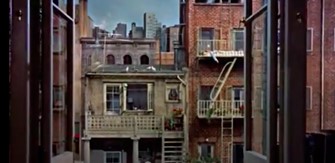
The camera pushes in on various windows. The camera replicates the first person perspective, it is a surrogate for all of us as viewers. In this scene, the camera movements mimic the act of “looking closer”, and foreshadows the theme of intrusion.
Jazz music by Franz Waxman sets the mood for the movie as the credits play. Throughout the film, music is understood as being part of diegetic sound. Hitchcock gives viewers the impression that opera singing and jazz music is spilling out from Jeffries’ neighbours apartments. This emphasizes how densely populated and closely connected the inhabitants of the city are.
Lighting also creates a sense of warmth and familiarity. This setting is one that viewers ought to be familiar with, there’s nothing extraordinary about it. It’s the start of a brand new day.
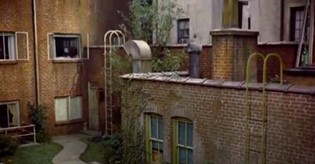
Hitchcock uses mise en scene to establish a sense of familiarity and situate the audience in a familiar environment. This shot depicts a common apartment block, and there is nothing special about it. This will later be juxtaposed against the very disturbing events the protagonist witnesses as the movie unfolds.
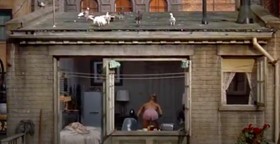
Movie viewers become increasingly perturbed by the voyueristic perspective adopted by Hitchcock’s camera. As the camera pans, we have a clear view of a half-naked lady in her own bedroom getting dressed. Evidently, she is unaware that she is the center of attention, or indeed, that anyone is watching her in the first place. Viewers are on the outside, looking in.
Sounds: children’s voices playing in the street. These types of diegetic sound creates a sense of normalcy and safety. This is by all accounts, a regular neighbourhood and a regular block of apartment buildings.
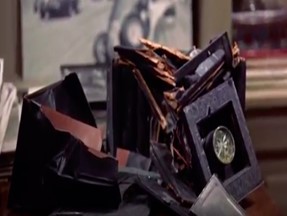
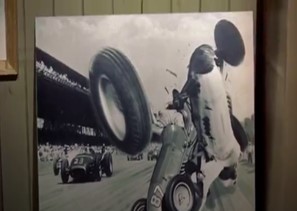
Viewers’ interaction with Jefferies, how we access his character, is purely through the camera work. As it pans to the side, we see a few of Jefferies’ cameras strewn on the table, and through the art hanging on the wall – these are his masterpieces.
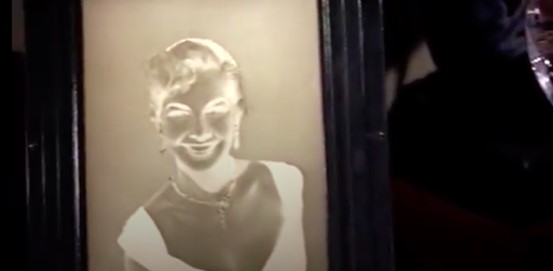
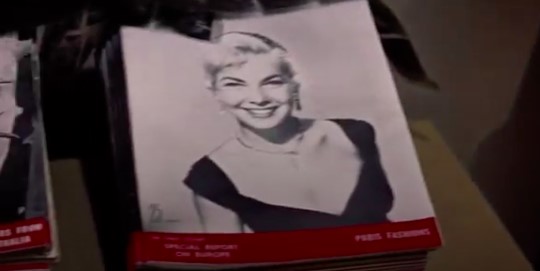
Mixed up between the ordinary black and white photographs hanging on the wall is this picture enclosed within the borders of a black frame. This stands out as being quite a scary and confronting image – with the colors inverted, the lady depicted in the photograph looks terrifying. This helps to foreshadow the darker themes of the film. Although there is a big shift in the images portrayed, the camera simply pauses briefly before resuming its pan, in an almost blase, nonchalant manner to glide over this interruption. Though we later see the real image, a very flattering portrait, subtly, we know that everything is not as it seems.
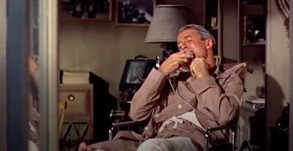
Cut to the next scene, where Jefferies is portrayed as being in the middle of quite an intimate personal grooming routine. It is unusual to do this in front of random strangers, right in front of the window. Typically, individuals trim their beard in the bathroom.
Note that Hitchcock’s camera is very restless, it’s almost constantly in motion. This creates visually appealing and engaging scenes, and conveys the fast paced essence of life in the city. When the camera stays still, HItchcock thus invites viewers to listen to the dialogue in greater detail.
Sound: The phone rings.
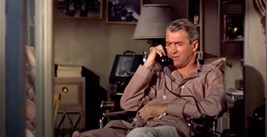
“Six months with nothing to do but to look out the window at the neighbours”
A private conversation, and yet, we as movie viewers can hear both sides. As Jefferies converses, he glaces out of the window intermittently. The camera adopts his perspective, depicting various neighbours engaging in private activities, unaware that they are being spied on.
The fact that Jefferies can see such close detail into his neighbours windows suggest the densely packed, urbanised, interconnected nature of the community’s lives.
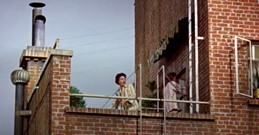
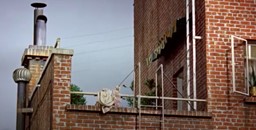
This scene is a rare one that is not framed from behind a window. It alludes to the idea that private affairs are conducted out in the open, and that it’s plain for anybody to see what’s going on. The idea of being open and extravagant in sexuality is emphasised, as is the notion of voyeurism.
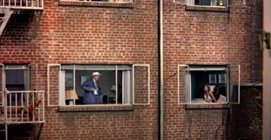
“Can you just see me? I’m rushing home to a hot apartment to listen to the automatic alarm ring, and the electric dishwasher, and the garbage disposal… A nagging wife.”
“Jeff, wives don’t nag anymore. They discuss!”
“Maybe in a higher rent district they discuss. In my neighbourhood, they still nag.”
The dialogue alludes to changing gender norms and power dynamics between married couples.
Complementing this is a beautifully constructed shot, demonstrating just how much Jefferies can see from looking into the windows of his neighbours. In this shot, the “action” is framed behind windows. He witnesses a conflict among his neighbours, a husband and wife who appear to be at odds with each other. This marital conflict forms the basis of his suspicion that his neighbour has murdered his wife.
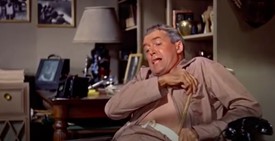
Hitchcock goes out of his way to depict Jefferies in an extremely unflattering light. Moments such as these, where he is seen trying to reach an impossible itch, with a look of intense concentration on his face, are usually done behind closed doors without people watching!
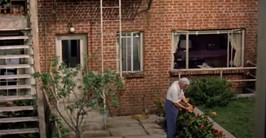
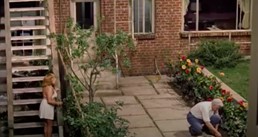
“Oh, why don’t you shut up”
The quarrelling husband is seen tending to the flowers in the garden. As a neighbour watches on, she gives unsolicited advice. The notion of intrusion and fluid boundaries within a densely packed apartment complex resurfaces yet again.
Sounds: sirens in the distance. Though being part of diegetic sound, and we associate this siren with the regular sounds of a city, we can also treat this is a harbinger of doom. It is intended to literally raise the alarm in the viewers’ minds.
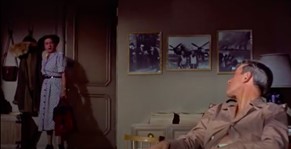
“New York state sentence for a peeping tom is 6 months in the workhouse. They got no windows in the workhouse”
“Oh dear, we’ve become a race of peeping toms. What people ought to do is get outside their own house and look in for a change”
“How’s that for a bit of homespun philosophy?”
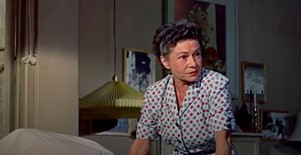
“When General Motors has to go to the bathroom ten times a day, the whole country’s ready to let go”
“Well, Stella, in economics, a kidney ailment has no relationship to the stock market, none whatsoever.”
Hitchcock captures the essence of the American life/ social context in the 1950s through dialogue. She’s an “insurance company nurse” → interesting sign of the times.
Stella’s line “I can smell trouble right here in this apartment. First you smash your leg and get to looking out the window, see things you shouldn’t see. Trouble.” foreshadows what’s going to happen later on in the movie.
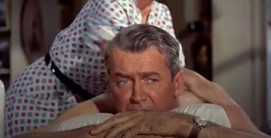
“I’m not ready for marriage!”
“She’s just not the girl for me… She’s too perfect. She’s too everything but what I want.”
“When I do [get married], it’s going to be to someone who thinks of life not as a new dress and a lobster dinner and the latest scandal. I need a woman who’s willing to go anywhere and do anything”
Note Jefferies’ childish idealism about relationships. His child-like mindset is revealed as he laments about his girlfriend. Hitchcock uses this shot to almost infantilize Jefferies. Here, he’s depicted as being incapable of doing anything at all. He is dependent on a woman half his size to wash him, move him, clothe him. While he is lying down face first, he complaints about his girlfriend.
There is a moment of striking dissonance between this infantilizing portrayal, and other elements which point to his level of success. His watch is a clear status symbol, his salt and pepper gray hair allude to his high level of experience as a photographer. Complementing this scene is dialogue which exposes Jefferies’ indecisive, half-hearted and uncommitted character.
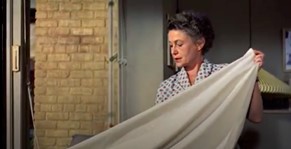
“Nothing has caused the human race so much trouble as intelligence. Modern marriage… Baloney! Once it was see somebody, get excited, get married. Now, it’s read a lot of books, fence with a lot of four syllable words, psychoanalyze each other, until you can’t tell the difference between a petting party and a civil service exam”
While Jefferies has remained immobilized by his injury and confined to his wheelchair, Stella is a ball of energy and in constant movement — a direct character foil. Since the moment she stepped into the apartment, she has not stood still, rather she is depicted as always moving around and always talking. Her quick wit, particularly in relation to the state of social relationships and marriage in society, reflects the common sensibilities shared by traditional, conservative Americans. This is an interesting point of contrast to Jefferies’ overly idealistic understanding of relationships.
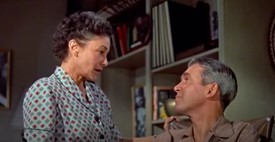
“Will you fix me a sandwich please?
“Yes I will and I’ll spread a little common sense on the bread”
Modern day feminists are likely to recoil in horror at Jefferies’ request. Yet, Stella’s clever deflection enables her to re-assert some dominance in the relationship. Through dialogue and the relationship between Stella and Jefferies, Hitchcock uncovers the changing social norms pertaining to gender in 1950s America. Viewers are likely to notice the infantilizing depiction of Jefferies again. Although he is much bigger in reality compared to Stella, because he is confined to a wheelchair, he looks like a small school boy asking his mom for lunch in this shot. We are intended to be highly critical of him and his abject lack of independence. Even though we have some sympathy for him as he is stuck in a wheelchair, his trivial pursuits of spying on his neighbours and the fact that he is taking joy in it, cause us to be revulsed.
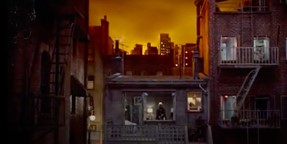
New York at sunset.
Sound: piano and someone practicing singing musical scales. Voices of children playing in the street.
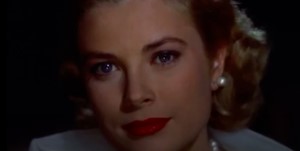
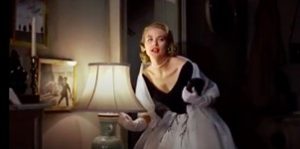
The Hitchcock blond, a picture of glamor and beauty. Lisa Freemont’s face looms over Jefferies and fills the entire screen, allowing us to appreciate her beauty. She lights up his life.
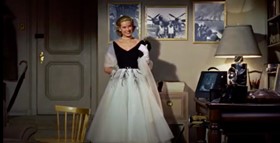
“Are you the Lisa Freemont who never wears the same dress twice?”
“Only because it’s expected of her”
Hitchcock uses costume, hair, and make up to depict Lisa in a traditionally feminine way. This character represents conformity with social expectations of the time. The camera shots and lighting are chosen deliberately to cast her in a very positive, beautiful light. We are encouraged to view her as a likeable character, one who is stereotypically female. This conception will be later challenged, as Lisa emerges as the courageous hero of this story.
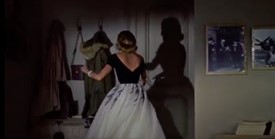
Hard lighting illuminates only part of the room. It casts rather ominous, clearly defined shadows on the walls. This undoubtedly alludes to the danger to come in the later part of the movie.
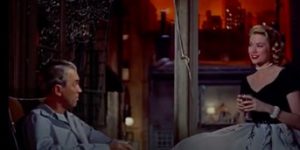
“I can see you looking very successful and very handsome in a dark blue flannel suit”
“Let’s stop talking nonsense, shall we?”
Red is the predominant color in the background of this shot. It emphasizes the romantic nature of Jeffries’ and Lisa’s dinner. On another level, red can also be interpreted as the color of danger and alarm, foreshadowing the danger that Lisa will put herself into for the sake of finding out the truth about Jeffries’ neighbour.
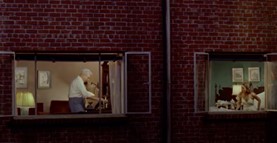
Sirens in the distance, growing increasingly louder. Danger? Alarm? Disrupting the peace? This is Hitchcock’s signature style of building tension.
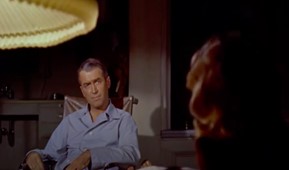
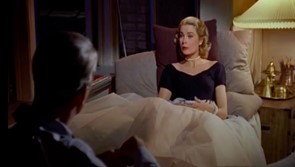
“Lisa you’re not meant for this kind of life. Few people are.”
Jeffries’ personal life is fraught with troubled relationships. He’s seen here arguing with his girlfriend. Through a series of reverse shots, both characters take turns being depicted in the light and being cast in the shadows. Hitchcock thus uses lighting to dramatise the interpersonal conflicts that arise throughout the course of the movie, in particular, that these two characters are not thinking on the same wavelength.
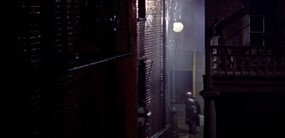
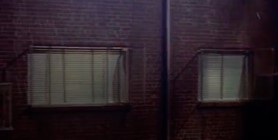
“What would he be selling at 3 o’clock in the morning?”
It’s in the middle of the night. It’s raining heavily. The environment depicted here creates another type of atmosphere. What previously looked warm, inviting, and familiar is now portrayed as cold, unpleasant, and gloomy. Hitchcock’s use of one bright street light to illuminate the suspicious figure heightens the sense of mystery and tension in this scene. Jeffries has just spotted a suspicious character in a dark trench coat, carrying an even more suspicious looking silver suitcase. The windows that used to be open, now remain closed to prying eyes. Jeffries’ suspicion toward his neighbours grows.
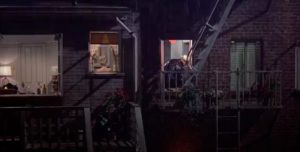
Hitchcock uses the windows to frame his shots. In this scene, we see that he’s aligned two windows side by side, featuring two of Jeffries’ neighbours. Though this is a limited perspective, we get the sense that the community is ‘so close yet so far’. Despite being in close physical proximity, the lives of these neighbours could not be more different! This perhaps hints at the paradox of life in the bustling New York City — that you can be surrounded by people, yet feel lonelier and more alienated than ever.
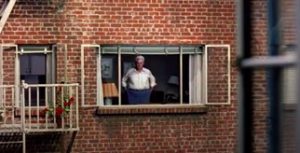
“That’s no ordinary look. It’s the kind of look a man gives when he’s afraid somebody might be watching him”
Sound: Opera singing, dramatises this scene by adding tension.

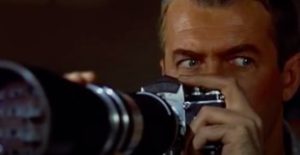
This shot is framed from the perspective of Jeffries’ extended camera lens. We see the suspicious salesman from the next apartment block, going about his normal routine nonchalantly. If he were indeed a murderer as Jeffries’ suspects, then this depiction serves to exaggerate his sociopathic tendencies. Jeffries’ suspicion of his neighbour grows.
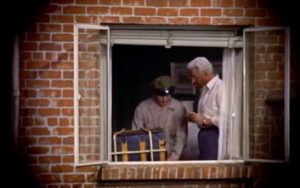
This shot is framed from behind Jeffries’ long camera lens. Although they are in separate apartment blocks, Jeffries has a clear look into the ongoing suspicious activities in Thorwald’s apartment. This is a visual symbol for the transgressive act of intruding on privacy. However viewers tend to sympathise with Jeffries as he is only spying on his neighbour for a good cause, to discover whether or not Thorwald killed his wife.
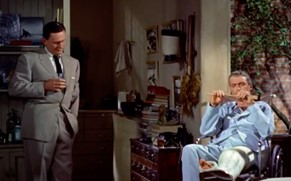
This shot juxtaposes the presentation of Jeffries with his friend from the police force. In this balanced shot composition, we see the extreme ends of the spectrum in masculinity. While Jeffries’ is rendered powerless, immobile, injured, in his light blue pajamas, fiddling with a back scratcher, his friend is wearing a sharp and crisp business suit, drinking alcohol, and depicted standing up tall. As the film progresses, we see how Jeffries’ loses parts of his identity. We already know that he’s unable to continue with being a photographer due to his injury, and that being a photographer is a point of pride. Jeffries’ presentation here seems to amplify the characterization of his infantilizing aimlessness.
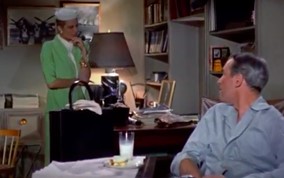
Again, Lisa is seen turning on all the lights in his living room. This arguably a comment on how she is relentless in her pursuit of truth, and foreshadows her sacrificial and heroic acts later on in the play to bring the murderer to justice. It could also be related to the film’s romantic subplot – although Jeffries is indecisive about whether to marry her, she lights up his life and removes the darkness.
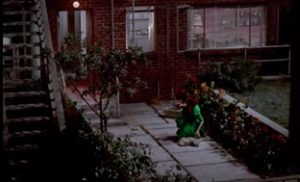
A piercing cry disrupts the peaceful night. A neighbour’s dog has been found dead. Perhaps this is a progression of tension in the film, another sign to illustrate that there’s more than meets the eye behind the veneer of normalcy in this community. The darkness of the night increases the sense of mystery and horror at the dog’s death – there’s a murderer in this community who’s killing innocent dogs and no one knows who it is.
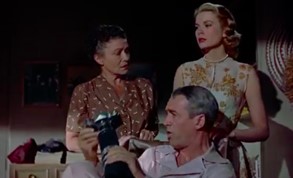
The two female characters decide to find out what’s buried in the garden in a humorous flip of gender stereotypes. Lisa, who’s dressed well and all dolled up, and Stella, an elderly woman who’s small in size are eager to do the dirty work. What began as Jeffries’ secret suspicion of his neighbour has suddenly escalated.
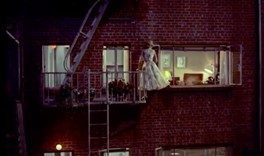
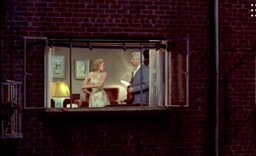
Lisa’s heroic act. As she is across the block from Jeffries and Stella, the sense of her vulnerability is intensified. She is all alone in the home of a suspected murderer. While Jeffries and Stella are able to see how Lisa is in danger, they are powerless to do anything to stop it, except to witness it & call the police.
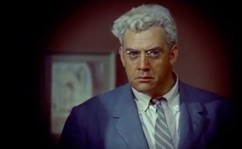
A truly terrifying shot, as Thorwald looks at Jeffries straight on. From behind the long camera lens, the killer’s face is clearly in view. Jeffries secret investigation has been discovered and viewers speculate that the killer’s wrath has been incurred. Dramatic tension is built up as we anticipate that Thorwald will attack Jeffries next.
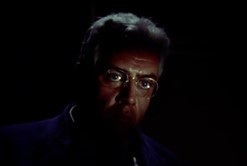
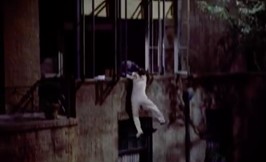
Dramatic and harsh lighting is used to emphasize Thorwald’s villany. As we can’t see all of his face, or even whether he’s brought a weapon, this assists Hitchcock in presenting him as a dangerous character. Viewers also fear for Jeffries’ safety. Hitchcock uses sound effects of footsteps coming up the stairs to symbolize Jeffries’ imminent danger. Moreover, Jeffries’ helplessness is intensified as he desperately tries to find a hiding place in his apartment while being immobilized by his injury. In his struggle with Thorwald, this is where Jeffries is rendered the most powerless.
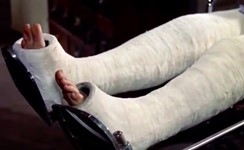
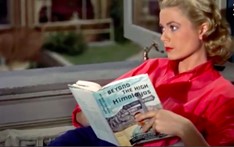
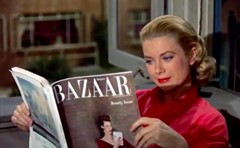
As the film concludes, Hitchcock inserts humor as we see that now both of Jeffries’ legs are injured. For all his good intentions in trying to catch Thorwald, he’s only put himself in the wheelchair for a longer time. On the other hand, the final shot captures the progression of Lisa’s character. Previously, she was a symbol of traditional femininity as emphasized through costume, hair, and make up. Here, she is seen wearing pants. She reads both Bazaar and a book about travelling to the Himalayas.
QUOTE ANALYSIS
Theme : Romance and relationships (marriage)
Jeff: If you don’t pull me out of this swamp of boredom I am going to do something drastic.
Jeff’s Editor: Like what?
Jeff: Like what. I’m gonna get married and then I’ll never be able to go anywhere.
In this opening sequence Jeff is portrayed as an adventurous man with an exciting occupation. He is a globetrotting photojournalist for a prestigious magazine who is willing to take risks in to order to distinguish himself in his career. In fact, in his last assignment he positioned himself so close to a racing car track that it caused him to break his leg and remain in a cast for seven weeks. In this telephone conversation with his editor we understand that he has only a week remaining before his cast is removed. However, he is itching to get back to work and is disappointed that his editor will not give him an important assignment. As he is discussing this we can see Jeff observing his neighbours through his rear window in Greenwich Village (New York) watching their banal daily activities.
Jeff’s Editor: It’s about time you got married before you turn into a lonesome and bitter old man
Jeff: Yeah, can’t you just see me, rushing home to a hot apartment to listen to the automatic laundry and the electric dishwasher and the garbage disposal and the nagging wife…
Each apartment is framed almost as though it is a film or television screen, allowing the viewer to observe intimate and private moments not normally available for people to watch. However, this seems a very bland existence in contrast to the exciting life of travel and daring activities that his job involves. This is further accentuated by the mise-en-scène where his surroundings show some of the exciting images he has captured with his camera. The photos he has taken are framed and hanging on the wall to highlight the prestige of his work. In the background we can see his apartment has large shelves filled with books which suggest that Jeff is a well-educated and refined man.
We can see that Jeff’s boredom is profound and he jokingly suggests that his editor should rescue him before he plunges himself into further depths of a mundane existence. His reference to married life is equated with the ordinary and seemingly domestic lives he is observing in the surrounding apartments. Thus, marriage for Jeff is portrayed a place where one is confined by domesticity and represents an obstacle to his personal and professional aspirations. This is seen in the way he lists the new electrical appliances that are designed to make life easier for Americans giving them more leisure time. It is also a sign of wealth and well-being, but Jeff clearly states that he is not interested in this classic American dream. On the contrary, he has different expectations from life and desires more excitement and stimulation. While he is expressing these negative opinions of marriage he is observing Mr and Mrs Thorwald and the audience immediately associates them with the kind of trapped and unhappy couple Jeff has been referring to.
Jeff’s Editor: Jeff, wives don’t nag anymore. They discuss.
Jeff: Oh, is that so, is that so? Well, maybe in the high-rent district they discuss. In my neighbourhood they still nag.
Jeff’s view of marriage is very jaded and, therefore, we expect him to be resistant to the idea of romance and a meaningful relationship with a woman. Marriage represents a similar claustrophobic space, similar to his current situation. His cast prevents him from going out into the world and confines him to his apartment. This forces him to engage with ordinary people who are conducting ordinary lives. Jeff’s attitude to women as serving to impose limitations on men is especially echoed in his comment about the nagging wife and his denial that they are genuinely or naturally capable of rational discussion.
Jeff: Can you imagine her travelling around the world with a camera bum who never has more than a week’s salary in the bank. If she was only more ordinary…I need a woman who is willing to go anywhere and do anything and love it.
Jeff is discussing with Stella why he needs to break off his relationship with the wealthy Park Avenue socialite, Lisa Freemont. Jeff confessed to Stella that he is not ready for marriage but his real reason is that he thinks Lisa is not the right woman for him. Her upper-class manners make it difficult for him to consider her as a good life partner because his work involves a great deal of travel and adventure. He believes she does not share his sense of adventure and is only concerned with money and superficial appearances. Jeff cannot see himself in the kind of romantic scenario that he sees with the newly-wed couple who arrive in one of the apartments he is observing. Jeff makes it clear he cannot lead this kind of ordinary life and that he needs an extraordinary woman by his side. Despite her beauty and poise, he does not see this quality in Lisa and the more he observes the world through his rear window the more these ideas take seed in his mind.
Jeff: Miss Lonelyhearts (observing her acting out an imaginary situation). At least that’s something you’ll never have to worry about…we have a little apartment here that is probably about as popular as yours. You remember, of course, Miss Torso, the ballet dancer. She is like a queen bee with her pick of the drones.
Jeff and Lisa are indulging in the kind of observations of his neighbours that Stella disapproves of; they are watching their neighbours and passing judgement on their lives. Miss Lonelyhearts imagines what it would be like to entertain a male companion while the ballet dancer is surrounded by potential suitors all flocking to her home and competing for her attention. Jeff is making a commentary on their different and contrasting personalities. If Jeff does not marry Lisa he may himself end up like Miss Lonelyhearts, yearning for companionship. While Lisa will never want for attention because she is even more talented and attractive than Miss Torso. Jeff’s observations of his neighbours frequently confirm his worst fears about the relationship between men and women, and the more he has them under a microscope the more they seem to convince him of his opinions.
Lisa: You don’t think either one of us could ever change?
Jeff: Right now, it doesn’t seem so.
Lisa and Jeff have a very animated discussion about the very different worlds they belong to. Jeff is adamant that he is not willing to give up his exciting career as a photojournalist to work as a studio photographer for the New York elite. He is equally adamant that Lisa would never survive in his world. His career involves travelling to sometimes obscure or exotic locations under difficult and sometimes dangerous circumstances. He cannot imagine Lisa ever adapting to this kind of lifestyle, so they seem to have reached an impasse in their relationship despite their strong feelings for one another. It is clear that one of them needs to change in order for their relationship to work and Jeff simply does not consider this a possibility. Lisa, on the other hand, considers the idea of changing a distinct possibility and eventually proves Jeff wrong. When she helps him uncover Mr Thorwald’s sordid secret, putting her own life in danger and outwitting the murderer, Jeff begins to see Lisa in a completely new light.
Theme: Voyeurism (politics of looking)
Voyeurism, the act of secretly watching people to derive sexual pleasure, is portrayed as a form of entertainment. Jeffrey has relied on the voyeurism to substitute other more traditional or emerging entertainment mediums at the time of the film’s release. Jeff is positioned as a spectator who identifies with characters he sees in the kind of cinema he has invented for himself. As he observes and makes comments of the neighbours we are given an insight into the lives and activities of the neighbours but this information also allows Jeff to assert what kind of person he is and whether he could live the way his neighbours do. This mirrors the process of identification that is often theorised in film criticism. Cinema is not only a way to see the world it is also a way to define the self.
Stella: The New York state sentence for Peeping Toms is six months in the workhouse…They’ve got no windows in the workhouse. You know, in the old days they used to put your eyes out with a red-hot poker. Any of those bikini bombshells you’re always watching worth a poker.
Stella disapproves of the way in which Jeff has chosen to keep himself amused while recovering from his broken leg. In fact, she points out the social taboo of watching others and even suggests that he is engaging in a criminal activity. The idea that the cinematic gaze is also a perverse gaze is alluded to here. The spectator, much like Jeff, is deriving pleasure, which is sometimes of a sexual nature, through a privileged position of seeing that allows them to see people in their most intimate and private moments. The film is set during a summer heat wave so the women are frequently scantily dressed, especially Miss Torso. The neighbours are seen in their underwear or in their nightwear and so Jeff’s ability to see this is portrayed as an intrusion. Stella’s comments on his behaviour and that of spectators reinforces the perverse nature of voyeurism.
Stella: Oh, dear…We have become a race of Peeping Toms. What people ought to do is get out outside their own house and look in for a change.
Stella frowns upon his continual observation, especially because she suspects that he is using this to substitute sexual activity. Actually, she is making a more profound observation regarding surveillance. She is concerned that watching others is a way to scrutinise and judge them. In fact, Jeff’s curiosity and intrusive gaze on his neighbours is providing the spectator with the opportunity to observe themselves; ordinary, everyday people getting on with their lives. This kind of observation is facilitated through technology, in this case the power of the telephoto lens to reach into very intimate spaces. In contemporary society this ability to invade personal spaces has increased with technology and the ability to monitor others has become more intense. Jeff’s activity and use of technology foreshadows the future and the problematic role that this establishes between the observer and observed. What are the ethics of observing others and to what extent should these observations be used to interfere or intervene in the lives of these people? This is a conundrum that Jeff, Lisa and Stella must face as a result of their increasing interest in the lives of the neighbours.
Jeff: Get back! Out of sight! Quick!
Stella: What is it? What’s the matter?
At this point the danger of looking through the rear window becomes apparent. Jeff has outlined his very mysterious behaviour to Stella and we can see he has successfully developed the suspicion that Mr Thorwald has committed a crime. Stella interprets this as Mr Thorwald planning to leave his wife and they are now both deeply involved in the conjecture and speculation about the lives of the neighbours. If they are caught watching him then they could become the target of his violent inclinations. The idea that he could return their gaze would shift the balance of power between Jeff and his neighbours. Jeff’s secret observation of his neighbours is what allows him to gain so much insight. If the neighbours knew they were being watched, perhaps they would act differently. Jeff’s ability to enjoy watching his neighbours would be undermined and this highlights the importance of the power of the gaze and observing others without their knowledge.
Jeff: That’s no ordinary look. That’s the kind of a look of a man gives when he is afraid someone might be watching him.
Ironically, the salesman Mr Thorwald is being carefully observed by Jeff and this sets up a potential conflict between the two men. Stella expresses concerned that sleeping in his wheelchair and continually looking out his rear window and watching the neighbours has turned into an unhealthy obsession. Jeff has not slept well and his shoulders ache and are cramped from poor posture. As Stella massages his shoulders to give him some relief they discuss the observations he has made of the neighbours throughout the night, especially the suspicious behaviour of Mr Thorwald. Jeff tells Stella how he left the apartment several times in the rain carrying his sample case. Stella believes this is a sign that he is going to leave his wife and that he must be sneaking out his belongings. Their observations cast him as deceitful and someone to fear. In fact, as he approaches the window they retreat back into the shadows of the apartment in fear. As the camera pans down, Jeff notices Mr Thorwald looking down at the flower garden. Jeff slowly moves towards the light and his face and body are illuminated. This suggests that he has understood something important and intriguing about Mr Thorwald. However, the audience knows that there is one event he has not seen. Jeff was sleeping when Mr Thorwald left the apartment with a woman all dressed in black. This suggests that what we are able to observe and think we see is not always the full picture.
Lisa: Jeff – if you could only see yourself…sitting around, looking out a window to kill time, is one thing – but doing it the way you are – with binoculars and with wild opinions about every little movement you see – is a disease.
Jeff: Do you think I consider this recreation?
Now that Jeff is employing tools such as binoculars and a telephoto lens to help him get even closer to his subjects Lisa accentuates the social boundaries he is crossing. As a recreational pass time it is innocuous but Lisa’s comments suggest it has now become an obsession or possibly even an illness. This echoes Stella’s early comments that his fascination with his rear window is socially unacceptable behaviour and possibly even illicit behaviour. This helps to cast doubt over what he thinks he sees. If Jeff has become obsessed and he is, in fact, suffering from a disease, then his suspicions seem unfounded, even ridiculous. Thus, the permission to see also determines the credibility to what is perceived. Perhaps his suspicions about Mr Thorwald are a product of a disturbed mind. This increases the intrigue of the film as Jeff’s interpretation of his neighbour’s activity could just be a product of his boredom and his fertile imagination.
Doyle: That’s a secret private world you’re looking into out there. People do a lot of things in private they couldn’t possibly explain in public.
As Lisa and Jeff watch Miss Lonelyhearts entertain a young man in her room they see an example of Doyle’s argument. The young man begins to make heavy advances on Miss Lonelyhearts once she pulls down the blinds and he thinks they can’t be seen. Miss Lonelyhearts find him too violent and pushes him away. The young man is offended and leaves in a very disgruntled manner. Lisa and Jeff witness how people can behave very differently behind closed doors when they are not subject to the scrutiny of others. They begin to reflect on Doyle’s argument that watching the neighbours is unethical and is the same as intruding into their personal lives.
Lisa: I’m not much on rear window ethics … Jeff, you know if someone came in here, they wouldn’t believe what they’d see … You and me with long faces, plunged into despair because we find out a man didn’t kill his wife. We’re two of the most frightening ghouls I’ve ever known. You’d think we could be a bit happy that the poor woman is alive and well.
Here the idea of looking as a perverse practice. This suggests that we enjoy watching with anticipation of something horrific happening. This is an exciting pastime which we like to engage in. This is reflected in Lisa and Jeff’s disappointment that their suspicions have not been confirmed. They almost seem ready to give up their investigation when suddenly their suspicions are aroused again. A woman screams because her pet dog has been killed and all the neighbours, except Mr Thorwald, emerge from their apartments to see what has happened. They suspect that Mr Thorwald has killed the dog and they notice a difference in the flower bed, so Lisa and Stella begin investigations of their own.
Lisa: Jeff, if your squeamish don’t look.
At this point the audience begin to see things through the rear window that are difficult to watch. The plan that Lisa and Stella devise is dangerous, and Jeff is afraid that something will happen to them. They both tower over him as they make the plans and dominate him. This shows Lisa is gaining a position of strength and Jeff is developing strong feelings for her. He watches her with a mix of fear and admiration, especially when Lisa climbs up the fire escape to make her way into Mr Thorwald’s apartment. He sees evidence of her more adventurous nature which makes Lisa more attractive to him but at the same time she is now in great danger. Thorwold returns to his apartment before she can leave and Jeff is forced to watch as she is attacked. He jostles in his wheelchair as they wait for the police to arrive and rescue Lisa. Jeff’s role as an injured photographer parallels that of the film viewer; a spectator who is bound to a chair and can only observe. However, this viewing dynamic is dramatically disrupted when Thorwald notices that Lisa is sending Jeff a signal by pointing to the wedding ring which she has managed to slip on her finger. Mr Thorwald looks up directly into the camera and directly at the spectator. The knowledge that he is being observed now puts him in a position of power and his gaze becomes threatening and menacing. Suddenly the actions that Jeff has been observing from a safe distance leap out of the frame of the rear window and begin to represent a real physical danger. This parallels the role of the spectator in the cinema who is physically moved in the horror genre. Hitchcock was a renowned master of this genre and incorporates many of its elements in this scene.
Coyne: (to Stella): Want to take a look?
Stella: No thanks, I don’t want any part of it.
Stella has given Doyle information to suggest that one of the body parts is inside Thorwald’s apartment and the police officers confirm her suspicions. They find a hat box inside Thorwald’s apartment that conceals a portion of the dead body. Doyle offers her the opportunity to see the body part with her own eyes, but she declines using an expression to indicate that she does not want to get involved in the discovery of Mr Thorwald’s crime. Unfortunately, her choice of words means that she has made a terrible yet amusing pun and she is horrified at the double meaning of her words. However, this allows the tone of the film to end on a more light-hearted and comical note. The camera pans around the apartment building and the spectator can see that calm and ordinary innocuous everyday activities have been re-established outside Jeff’s rear window. The pianist and Miss Lonelyhearts become friendly, the Thorwald appartment is being cleaned and repainted, a new pet dog has been found for the couple upstairs, Miss Torso’s husband returns from the army, and the newlyweds are settling into a more normal and somewhat acrimonious married life. All the problems that Jeff has been observing find a happy resolution. As the camera pans across into Jeff apartment the comedy is reiterated through the image of Jeff still confined to a wheelchair but this time with two broken legs. Despite this he has a big smile on his face and Lisa is seen lying down nearby. She is wearing much more practical clothes and reading a book called Beyond the Himalayas. Her more practical apparel and her interest in adventurous locations show that she is willing to make the changes in her personality that suit Jeff’s idea of a perfect wife. However, Lisa still keeps a keen interest in fashion. The spectator can see this as she looks across to Jeff furtively, checking that he is asleep. She promptly puts the book down to open a copy of the fashion magazine, Bazaar. Perhaps she hasn’t changed at all and will keep this a secret from Jeff.
Theme: Class difference (social hierarchy)
Jeff: She’s just not the girl for me.
Stella: Yeah, she’s only perfect.
Jeff: She’s too perfect. She’s too talented. She’s too beautiful. She’s too sophisticated. She’s too everything but what I want.
Jeff uses class difference to highlight why Lisa would not be a suitable wife for him. He references her association with Park Avenue, the most expensive high-class area in New York, and the fact that she frequents expensive hotels and restaurants. He believes that Lisa lives a very privileged life where a new dress or a lobster dinner are her usual daily preoccupations. Despite the way Jeff distinguishes himself from his ordinary, and somewhat boring neighbours, he believes that he and Lisa are from vastly different classes and this is what makes her incompatible as a potential wife. Her class is an obstacle to Lisa meeting the idea of the perfect wife that Jeff has envisaged and described to Stella.
Lisa: I could get you a dozen assignments tomorrow…fashion, portraits…Don’t laugh I could do it!
Jeff: That’s what I am afraid of. Could you see me – driving down the fashion salon in a jeep – wearing combat boots and a three-day beard?
Lisa imagines Jeff settling down into a nice placid job as a studio photographer once they get married. Again, their class difference is used by Jeff to accentuate the idea that they are not a compatible couple. Lisa suggests she would be able to help in enter her prestigious world of New York high society and find some lucrative assignments. He mocks her, not because he doesn’t think she can do it, but because he knows this is how she would tie him down and lure him into a conventional marriage; the kind he has observed through the rear window and does not like. Lisa becomes quite despondent at this point as she can see that Jeff cannot be persuaded that they are match made in heaven and she seems like she is going to give up. She retreats into the kitchen while Jeff watches Miss Lonelyhearts imagining she is has company. Lisa’s despondency is echoed by the sadness in Jeff eyes as he observes a woman who feels alone without a man.
Lisa: There can’t be that much difference between people and the way they live. We all eat, talk, drink, laugh, and wear clothes
One of the reasons that Jeff argues Lisa is not a good match for him is their class difference. He does not believe that someone who works for a fashion house and frequents some of the finest restaurants and hotels in New York can have the same sense of adventure and willingness to live the modest and more practical life that Jeff leads. Lisa does not believe that their class difference means that they cannot fit into each other’s worlds. It is clear that Jeff insists that his wife must show the qualities that prove she would be able to exist in the world of a photo-journalist that involves extensive travel and living in rough and dangerous environments. This is in stark contrast to the comforts that Lisa has shown she is accustomed to by wearing a glamorous and expensive evening gown and ordering dinner from a fine restaurant that is delivered to Jeff’s apartment. The image of Lisa in this scene contrasts greatly with the image of Jeff’s ideal woman that he describes. Lisa is wearing an expensive and glamourous evening gown. In this scene the visual information accentuates contrast with the information provided in the dialogue. This conversation brings their relationship perilously close to the end. As Lisa leaves the apartment she says good-bye rather than good-night and this suggests she is thinking about abandoning Jeff, even if she is very much in love with him.
Theme: Seeing and believing (interrogating vision)
Jeff: Why would a man leave his apartment three times on a rainy night with a suitcase, and come back three times?
Lisa: He likes the way his wife welcomes him home.
Jeff believes something sinister is happening in the Thorwald apartment and he has used his telephoto lens on his camera to get a closer look at him. When he holds up the lens it looks majestic and powerful and the reflections of all the apartment building can be seen in the reflection on the big round lens. This lens penetrates the secret world of the neighbours and captures Thorwald in close up. It allows Jeff to watch him wrapping up a large butcher’s knife and a small saw in newspaper. Up until this point in the film everything Jeff has observed has been from a distance and often the equivalent of a long shot as he surveys the banal activities of his neighbours within the different apartments. The closer he is able to get to their movements and actions the more he is able to uncover about them. Thorwald’s actions continue to prey on Jeff’s mind and he is unable to think of anything else, even while in a romantic embrace with Lisa where she is kissing him. She is struggling to keep his attention as he questions what he has seen.
Jeff: Why didn’t he go to work today? …Why hasn’t he been in his wife’s bedroom all day? …There’s something terribly wrong.
We can see that Jeff’s imagination is beginning to run wild and he is presuming that Mr Thorwald has committed some kind of brutal crime. All the answers to the questions that Lisa offers are dismissed by Jeff. She is trying to explain the behaviour in more ordinary terms in the hope that she can get Jeff to concentrate on her, but Jeff is not satisfied with her explanations. Lisa gives up and moves away to smoke a cigarette and we can see that the answers Jeff imagines are leading him to the conclusion that Mr Thorwald has harmed his wife in some horrible way. This further confirms his belief that marriage is a destructive relationship that can lead to violence and horror. The audience can see how these preposterous conclusions and beliefs risk creating an even greater rift between Lisa and Jeffrey, reducing the possibility that they will ever come together as a happy couple.
Jeff (looking at Miss Torso): That would be a terrible job to tackle … Just how would you start to cut up a human body?
Lisa: Jeff, I’ll be honest with you. You’re beginning to scare me.
Lisa is appalled at his conclusions and she reprimands him for becoming too obsessed with his rear window observations. She is adamant that his conjecture is disgraceful and the product of an unhealthy mind. Her arguments are persuasive as she reminds him that a murderer would hide behind curtains and not commit such a terrible act in open view. Suddenly, there is a medium close-up of Lisa as she stands up with a frightened expression on her face. Her gaze is now fixed on the rear window and there is a chilling change in the mood of the scene. They both look out the window and see Mr Thorwald tying up a large trunk, and Lisa finally begins to see what Jeff is seeing.
Lisa: Let’s start from the beginning again. Tell me everything you saw and what you think it means?
The camera dramatically zooms into another close-of Lisa’s shocked expression. Now Lisa wants to know everything Jeff has observed in the apartment. Now that she also witnessed some very odd behaviour Lisa no longer thinks that Jeff has allowed his imagination to run away with him. The world through the rear window begins to appear full of suspicion and intrigue for Lisa too. This shows how Lisa is beginning to shift her vision to align more closely with Jeff’s, and this marks the beginning of an important change in their relationship, especially in the way they see each other.
Stella: Now just where do you suppose he cut her up?
Stella has a very down to earth and somewhat cynical view of the world and so she has been doubting what Jeff thinks he sees. Her question about how Mr Thorwald has disposed of the body is a sign that she now also shares Jeff’s suspicions. Stella also adds some important comical relief to the film which ultimately ends up being a romantic film as well as a thriller. When she asks this question, the characters are framed in a two-shot or a medium shot. Stella is positioned behind Jeff as they look out through the rear window. We can see he is about to enjoy some breakfast that Stella has prepared for him. Jeff soon loses his appetite when she starts to imagine where and how he has killed his wife, suggesting it must have been in the bathtub. Her talk of washing away blood has not affected her appetite as she bites into a piece of toast. Jeff, on the other hand, can no longer stomach his food. Thus, the camera work is aiding in creating the humour. This composition of the shot highlights the irony of the situation. Jeff has been trying to convince people of his suspicions and when Stella finally shows signs of believing him it is not welcomed.
Doyle: You didn’t see the killing, or the body? How do you know there was a murder?
Jeff: Because everything that man’s done has been suspicious. Trips at night in the rain, saws, knives, trunks with rope, and a wife that isn’t there anymore.
Detective Doyle explains the constitutional rules that govern his ability to conduct an investigation and offers Jeff sensible explanations for the activities that he thinks he has seen. In fact, in light of Doyle’s preliminary investigations Jeff begins to feel foolish and thinks he has let his imagination get the better of him. It appears that Mrs Thorwald is, in fact, convalescing in the countryside. He returns to observing the other neighbours through his telephoto lens and Mr Thorwald come back into his field of vision. He sees that Mr Thorwald is packing and may be preparing to leave and that some of Mrs Thorwald’s belongings have remained in the apartment, which is strange given that Doyle has established she has gone on a trip.
Jeff: Did anybody actually see the wife get on the train?
Doyle: Did anyone, including you, actually see her murdered?
Here the two men a battling over the extent to which one can believe what they see. Just as Doyle demands some visual evidence that Mrs Thorwald has been murdered Jeff, equally demands visual evidence that she is still alive. Therefore, the question of Mr Thorwald’s guilt relies heavily on the ability to believe what one sees. Jeff scoffs at Doyle’s ability as a detective as he thinks that the police are not willing to seriously question Mr Thorwald’s actions and movements. Lisa and Stella, however, increasingly see Mr Thorwald from Jeff perspective and they start to interrogate everything they see.
Jeff: Did anybody actually see the wife get on the train?
Doyle: Did anyone, including you, actually see her murdered?
Lisa uses her knowledge of women and women’s fashion to deduce that the woman seen leaving the apartment with Mr Thorwald could not have been his wife. The fact that she has left her favourite handbag behind and that her jewellery was casually stuffed into the bag leads her to the conclusion Mrs Thorwald did not leave the house or go on a trip. As she explains her theory Jeff looks up to her with an admiring gaze. Lisa proves her worth as an investigator and Jeff immediately feels aroused by Lisa. He wants to embrace and kiss her, something he has shown little interest in doing so far in the film. Her ability to share an interest in his observations through his rear window balances the power dynamics between them. Jeff acknowledges this by showing signs of accepting a romantic involvement with Lisa. The underlying message is that successful relationships are be based on equality not patriarchal authority. The film is enacting a progress narrative in terms of gender relations.
Theme: Gender roles and equality
Jeff: Is this the Lisa Freemont who never wears the same dress twice?
Lisa: Only because it is expected of her. It’s right off the Paris plane. Do you think it will sell?
Lisa is portrayed as adhering to the expectations associated with her gender role. As a woman she is expected to look glamorous and attractive for men. Jeff imagines Lisa as the kind of woman who is a spoilt socialite and the way she moves around the room, almost performing for Jeff, seems to confirm this. Lisa switches on the three lampshades, one after the other and gradually reveals the glamorous evening gown she is wearing. Her dress has a fitted bodice with a deep V cut down in the front. This design is echoed at the back as the V shape reaches her lower back. The V shape also gives the bodice an off the shoulder quality and heightens the sensual nature of the dress. The opulence of the dress is seen in the full length white chiffon tulle skirt. It has delicate back floral decorations emanating from the narrow patent leather belt which accentuates her tiny waistline. She is also wearing a white chiffon shoulder wrap and white silk gloves that reach her elbows to further indicate elegance.
As Lisa moves around the room, and adds light to the scene, she is parading for Jeff. Finally, she twirls around as he talks about the value of her dress. All her actions, words and movement are designed to control and attract the gaze. In this case she is specifically aiming to attract Jeff’s gaze, hoping that looking at her in this beautiful gown will make him fall in love with her. Thus, seeing her beauty will help him to believe that she is the right woman for him. This shows Lisa in a very traditional role for a woman, one where they expected to be sexually alluring and entertaining for men. Many feminists have argued that women are too often sexually objectified in film, especially in Hitchcock films. The camera portrays Lisa exactly as the superficial fashion-conscious woman that Jeff has described.
Stella: (Accusingly) You shouldn’t have let her do that! If he ever —
Lisa takes a great risk when she agrees to take the note that Jeff has written for Mr Thorwald asking, “What have you done with her?” Lisa is almost caught by Mr Thorwald when she slips it under his door. As Stella and Jeff observe her narrow escape they are very relieved as they both question whether it is appropriate for a woman to be exposed to this kind of danger. However, the scene shows the importance of Jeff’s vision. What Mr Thorwald can’t see is that he is being observed and who is observing him and this puts him in a vulnerable position. Jeff’s observation of Mr Thorwald transforms into a typical masculine pursuit of him. Jeff’s vision gives him power and authority to hunt down a murderer.
Jeff: (Finds the number) Chelsea 2-7099. (He looks up, reaches for the phone) We scared him once. Maybe we can scare him again. (Picks up receiver; pauses) I’m using that word “we” a little too freely, I guess. I don’t take any of the chances.
Up until this point in the film Stella and Lisa have been in very traditional roles; Stella nurses and feeds him while Lisa provides light-hearted and romantic companionship. Although Jeff is confined to a wheelchair he has been portrayed as active and adventurous. This is especially highlighted through the constant reference to the dangerous nature of his work. By getting more involved in Jeff’s observations through the rear window Lisa has shown that she is not afraid to takes risks. In fact, she shows that she is very excited by the dangerous situation. Now the women team up to take control of the investigation into the mysterious disappearance of Mrs Thorwald. Only they believe Jeff suspicions and he needs their help if he is to prove to Detective Doyle that his suspicions are not irrational. Jeff is hesitant when he understands the women intend to search the garden outside Mr Thorwald’s apartment and wants to protect them. He devises a plan to lure Mr Thorwald away from the apartment so that Stella and Lisa can do this more safely. This shows that Jeff is developing a more progressive attitude towards the role of women and he can see that they are capable and able to do dangerous work too.
Stella: What’s she trying to do? Why doesn’t she turn him in?
Jeff: Smart girl.
Stella: Smart? She’ll be arrested!
Jeff: That’ll get her out of there, won’t it?
Lisa demonstrates her daring and cunning in a very tricky situation when she intrudes the apartment. She manages to use the arrival of the police not only to help her escape Mr Thorwald’s clutches but also to gather evidence of the crime. Jeff’s admiration of Lisa continues to grow as she shows both the physical ability to infiltrate the apartment, a place that Jeff has only been able to observe, and an intellectual ability to manipulate the situation with the police to get out of danger. Typically, when women are in dangerous situation in films, they often rely on a man to rescue them. Jeff is impressed by Lisa’s clever quick thinking.
ANALYSIS OF THE CHARACTER
Jeff (James Stewart)
Jeff represents the kind of ordinary man that cinema viewers can easily identify with. He is not a heroic or aristocratic figure. Although he is depicted as a refined and educated man he earns his living through hard work which often puts him in treacherous situations. His passion for his work is visible in his willingness to put himself at risk in order to take a spectacular or sensational photograph. Jeff is a thoroughly modern man in this sense and sees himself as different to the most people. There is a certain arrogance in his world view as he believes he is living an alternative life; one that is full of adventure and involves a rejection of the conventional notions of success and achievement. Hitchcock took great pleasure in creating these relatively ordinary individuals and placing them in unexpected, often bizarre situations. James Stewart was a very popular actor in Hollywood at the time and featured in several of Hitchcock’s film. He was not a typically handsome leading man but he comes across as a very amiable and likeable fellow, ensuring that the audience could easily identify with him and his situation.
Hitchcock liked to test his characters psychological rather than their physical resilience. He placed his characters in predicaments which subjected them to danger and distanced them in some way from wider society. In this way, the protagonist is forced to reckon with a different kind of logic and see through the surface meaning of exchanges and communications with the surrounding world. The strange or bizarre nature of these unusual circumstances were frequently portrayed with humour and were a source of amusement for both the character and the viewer. Jeff’s jaded view of marriage is the perspective through which he reads Mr Thorwald’s actions; presuming that the couple are in suffocating relationship from which there is no respite. Although Jeff’s suspicions are confirmed his view on marriage is altered because Lisa proves to be his ideal wife; through her courageous and cunning actions he is able to demonstrate that he can believe what he sees through his rear window.
Lisa Freemont (Grace Kelly)
Lisa Freemont is a lively, high spirited and independent woman who is very confident and full of self-assurance. Despite the fact that Jeff appears to be resisting her charm and desire to settle down she is able to gauge his psychological disposition and understand the source of his reluctance. Lisa’s narrative function is important both to the themes related to marriage and the power relationships between men and women. She represents a modern woman who is of independent means, knows what she wants and will pursue it without hesitation. This is evident in her willingness to assist Jeff in uncovering the Mr Thorwald’s gruesome murder. She places herself in significant danger when she first delivers the letter, creating enormous suspense as she only narrowly misses being seen by Mr Thorwald. Later when she goes into the garden with Stella and takes the initiative to climb up the fire escape and make her way directly into the Thorwald apartment she shows that she is physically agile and quite fearless. Thus, Lisa exhibits a great deal of determination to prove to Jeff that she is in fact suitable wife for him.
Grace Kelly was a Hollywood actress who is known for her beauty, elegance and aristocratic manner. Hitchcock’s leading ladies were frequently known as icy blondes. They were usually very attractive and somewhat mysterious. Their sophistication and poise often made them quite a formidable presence in the film and at times an adversary. These qualities are, in fact, what prevents Jeff from agreeing with Stella that Lisa would make an ideal wife. In his eyes her perfection exceeds his requirements. However, this is because he has allowed appearances to deceive him. Lisa’s enjoyment of refinement and luxury is not a sign that she is weak and helpless. Lisa shows that she is quite the opposite. Her independent spirit allows her to see Thorwald through Jeff’s eyes and to use her knowledge of women’s fashion and style to prove that Mrs Thorwald never left her apartment alive. Her understanding of the significance of leaving the handbag and jewellery behind goes beyond women’s intuition and prove to be important clues that neither Jeff nor Doyle could ever uncover. Thus, while Jeff seems to have correctly understood Mr Thorwald, the discovery of the crime also allows him to see a very different Lisa.
Stella (Thelma Ritter)
Stella is a very direct and pragmatic woman who is also a very astute observer. She seems somewhat concerned about Jeff’s unhealthy obsession with his rear window. She believes that this is an escape and substitute for other more normal pleasures and that Jeff has found a rather perverse and dubious activity to keep him busy while he is convalescing. Stella’s concern also stems from the fact that Jeff is not behaving like a normal red-blooded American man. His interest in the activities in his neighbourhood suggest that he gains more pleasure from watching the world and society rather than participating in it. She is particularly sceptical of his reluctance to marry Lisa. Stella often functions as the voice of reason in the film, she challenges all his notions about love and relationships and she does not see the activities through the rear window with the Jeff’s cynicism and directs this towards him rather than the outside world.
Stella’s stern and matronly manner also provide some delightful comic relief in the film. Her witty responses to Jeff’s comments about Lisa show that she thinks Lisa may in fact be too good for him. She describes Lisa as beautiful and Jeff as a “reasonably healthy specimen” to show that he would be foolish not to marry her. When he underestimates Lisa’s qualities, Stella slaps him with massage oil in a gesture to suggest he is being idiotic. This provides some great contrast to the seriousness of the suspicions that Jeff develops throughout the narrative. Stella is equally fearless as although she knows that Jeff’s observations will no doubt lead them to trouble her curiosity is also aroused. She happily speculates about the way in which Mr Thorwald has disposed of the body and her nursing training undoubtedly allows her to imagine the most practical way this could be done. This provides both important clues to the mystery of Mrs Thorwald’s disappearance and provides a macabre edge to her brand of humour. Thelma Ritter continued a long career as a comedy actor and played many similar roles in other Hollywood films.
Det. Lt. Thomas J. Doyle (Wendell Corey)
At the beginning Doyle’s involvement in this investigation is purely personal rather than professional. Much like Stella and Lisa, he thinks that Jeff’s imagination has run wild, possibly as a symptom of being confined to the wheelchair and not having any interesting activities to keep his mind busy. Doyle initially humours Jeff purely as a personal favour and because they served in the army together. This comradery seems to be the only reason he takes the investigation at all seriously. He conducts his inquiries in a professional manner and accepts the veracity of the information he has obtained. When he informs Jeff that Mrs Thorwald has been reported alive and is staying out of town, Jeff starts to feel somewhat foolish and concedes that his suspicions may be far-fetched. Doyle is particularly important in pointing out the limitations of the law and how people’s right to privacy prevents him from making further inquiries. The banter between Doyle and Jeff is endearing and shows that they are indeed very good friends, so much so that they can taunt each other without taking offence. In a way, Jeff was hoping that Doyle would handle the matter, but it becomes increasingly clear that Doyle’s capacity to investigate is limited. As a representative of law and order his hands are tied and he is unable to break the law himself to satisfy Jeff’s curiosity.
When Doyle meets Lisa he also shows that he is not a man who is willing to break rules nor listen to the opinion of a woman. He ridicules Lisa’s argument that the presence of Mrs Thorwald’s handbag in the apartment is a sign that her trip away has been staged. Doyle is sympathetic to their concerns but is unable to pursue the matter beyond the intrigue it has now created for Lisa and Jeff. Doyle’s insistence on following the rules and his refusal to consider Lisa’s opinion mean that Jeff is forced to take the law into his own hands. Doyle shows he is both a conventional detective and a conventional male. He represents authority and propriety. However, it becomes clear that neither of these qualities are actually useful to solve this mystery.
Mr Thorwald (Raymond Burr)
Mr Thorwald is undoubtedly an evil and villainous character, but his heinous actions are hidden behind a façade of respectability and decorum. To the outer world he appears to be a law abiding and dutiful citizen. He holds down a respectable job as a travelling salesman which is a foundational component of the capitalist economy which dominates the US. He is married and lives in a nicely furnished apartment. He appears to look after his wife in a caring manner despite her complaining and ungrateful tone. However, his cold calculated nature is gradually revealed and is particularly evident in the scene where it seems he has killed the neighbour’s dog. When the dog is found dead by the owner she screams at the top of her voice. Her grief and dismay can be heard throughout the entire neighbourhood. As Jeff notices, Throwald is the only person not to look out into the courtyard to see what all the commotion is about. This not only confirms his guilt to Jeff but shows his cold murderous manner to the viewer. The serious somewhat angry expression he usually has on his face takes on a much more sinister quality when this information comes to light. Raymond Bur has played a variety of roles in Hollywood films and also enjoyed a long career in television. His stocky and imposing stature makes him perfect for this duplicitous and threatening role.
Miss Torso (Gerogina Darcy)
As a dancer Miss Torso provides a great deal of entertainment for Jeff. When he observes her she is frequently stretching or practicing her ballet movements and routines. Miss Torso is clearly an artistic type who enjoys life. She often entertains handsome men in her apartment and enjoys flirting with them. Miss Torso seems very uninhibited as she happily displays her dancing ability and her talent for the neighbourhood to see. She seems to nurture a very independent and free-spirited nature, but she also harbours an unexpected secret; Miss Torso’s affections are reserved for a man who is very unlike her enthusiastic admirers. Miss Torso’s character is further evidence that looks can be deceiving.
Songwriter (Ross Bagdasarian)
The delicate and melodic music that often drifts from his apartment gives the sense of a creative and soulful character. His skill is portrayed as a difficult, emotional and sometimes protracted process. This is evident in the fact that he is seen throwing his music sheets to the floor in moments of desperation as well as being fully engrossed in the writing process working away at his grand piano. Lisa finds the songwriter’s music enchanting and touching. Her impression of the songwriter is romantic, and she imagines he is writing the music especially for her and Jeff. She admires his ability and wonders where he finds inspirations for such beautiful tones. Although the songwriter does not draw direct attention to himself his music is a charming, lyrical presence in the mise-en-scène.
Miss Lonelyhearts (Judith Evelyn)
The sadness that emanates from Miss Lonelyhearts gives a very negative portrayal of a woman who is without a man. While Jeff’s cynical view of marriage suggests that people are miserable and feel trapped by marriage, Miss Lonelyhearts suggests that a single life is far more depressing. This seems to be especially true for a woman as the songwriter is also alone but does not appear unhappy for this reason. Miss Lonelyhearts is so desperate for company that she pretends to entertain someone at home. She is portrayed as a rather pathetic character who is unable to manage a real date with a young man, particularly when it comes to being intimate with him. The evening ends disastrously as the young man storms out of her apartment. Miss Lonelyhearts is so depressed that Stella suspects she is contemplating suicide when she recognises the pills sitting on her bedside table. Like many of the characters in the film, Miss Lonelyhearts struggles with the notion of love and romance. However, she is redeemed by her coupling with the songwriter, who seems the perfect partner for her extremely fragile and sensitive nature.


Leave a Reply
You must be logged in to post a comment.